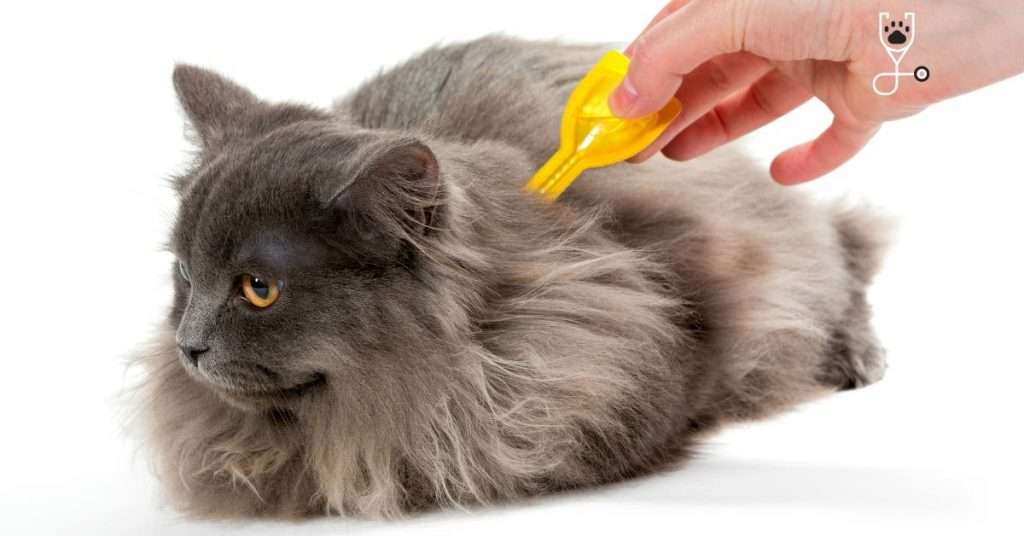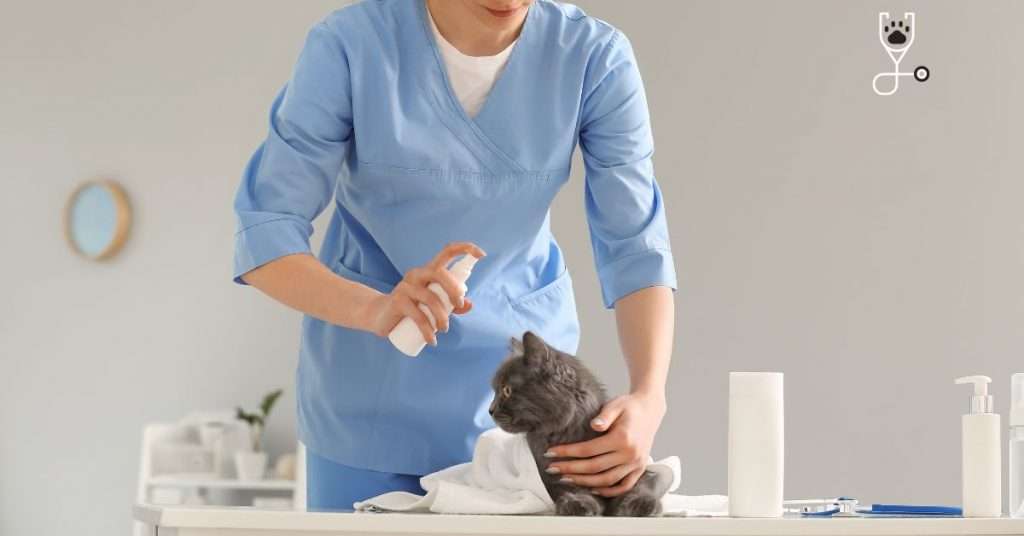What are Fleas?
Fleas are common parasites that can infest both cats and dogs.
While they may not be life-threatening, they can cause a lot of discomfort for your pet and make them very itchy. In this article, we will discuss six different flea treatments for fleas, including topical sprays, oral medications, and more. We’ll also provide tips on how to prevent fleas from infesting your pet in the first place. So if your cat has been scratching herself relentlessly, read on for some helpful advice.
Before we discuss the treatment options, let’s first dive into the causes and symptoms of the flea infestation.
How do Cats Become Infested With Fleas?
There are many ways that cats can become infested with fleas. The most common is through contact with other animals, such as dogs or wild animals. Fleas can also hitch a ride on humans, so if you’ve been outside in an area where fleas are present, be sure to check your clothing and shoes before coming inside. Finally, fleas can also jump from one animal to another, so if you have multiple pets, they may all need to be treated for fleas.
Symptoms of a Cat Flea Infestation

- A cat flea infestation can cause a variety of symptoms in both cats and humans.
- The most common symptom is itching, which can be caused by the flea bites or by an allergic reaction to the flea saliva.
- In severe cases, infested cats may develop hair loss, scabs, and skin infections.
- Humans may also experience itching, redness, and swelling around the bite site.
If you suspect that you or your cat has a flea infestation, it is important to seek treatment from a veterinarian or medical professional as soon as possible because if left unchecked, a cat flea infestation can quickly become out of control and difficult to treat.
Read More: What to Bathe a Cat With and Best Methods
Flea Treatment Options
There are a variety of treatment options available for cat fleas. Some treatments are more effective than others, and some have more side effects. It is important to consult with a veterinarian to find the best option for your pet. Below we enlist and discuss one by one each treatment option:
- Topical Treatments
- Oral Treatments
- Sprays
- Shampoos
- Natural Treatments
- Flea collars
1. Topical Treatments

Topical flea treatment is one of the most popular options for treating fleas on cats. It involves applying a medicated spot-on solution to your cat’s skin, typically between the shoulder blades. The active ingredient in the topical solution then moves through your cat’s body and kills fleas upon contact.
Topical treatments are typically effective for around 4 weeks.
Some of the most popular topical flea treatments for cats include:
Frontline Plus for Cats: This treatment contains fipronil and (S)-methoprene, which work together to kill adult fleas, eggs, and larvae. It is available in 0.67 ml, 1.34 ml, and 4.02 ml sizes.
Revolution for Cats: This treatment contains selamectin, which works to kill adult fleas and their eggs, as well as ear mites and roundworms. It is available in 0.75 ml and 4.02 ml sizes.
Check More About Cats Here: The Ultimate Guide To Cat healthcare
2. Oral Treatments
Oral flea treatment is another popular option for treating fleas on cats. It involves giving your cat a pill or liquid medication that contains an insecticide. The active ingredient in the oral treatment then moves through your cat’s body and kills fleas upon contact.
Oral treatments are typically effective for around 3 months. Some of the most popular oral flea treatments for cats include:
Capstar Flea Tablets: These tablets contain nitenpyram, which works to kill adult fleas within 30 minutes. They are available in 11.4 mg and 57 mg sizes.
Program Flea Control Oral Suspension: This suspension contains lufenuron, which works to prevent flea eggs from hatching. It is available in 4 ml and 8 ml sizes.
3. Sprays

Flea spray is another option for treating fleas on cats. It involves spraying a medicated solution onto your cat’s coat. The active ingredient in the spray then works to kill fleas upon contact.
Sprays are typically effective for around 2 weeks. Some of the most popular flea sprays for cats include:
Adams Flea and Tick Spray: This spray contains Pyrethrin and Pyriproxyfen, which work together to kill adult fleas, eggs, and larvae. It is available in 7 oz and 16 oz sizes.
Hartz UltraGuard Plus Flea and Tick Spray: This spray contains Pyrethrin and Pyriproxyfen, which work together to kill adult fleas, eggs, and larvae. It is available in 7 oz and 16 oz sizes.
4. Shampoos
Flea shampoo is another option for treating fleas on cats. It involves applying a medicated shampoo to your cat’s coat and then rinsing it off. The active ingredient in the shampoo then works to kill fleas upon contact.
Shampoos are typically effective for around 2 weeks. Some of the most popular flea shampoos for cats include:
Adams Flea and Tick Shampoo: This shampoo contains Pyrethrin and Pyriproxyfen, which work together to kill adult fleas, eggs, and larvae. It is available in 12 oz and 24 oz sizes.
Hartz UltraGuard Plus Flea and Tick Shampoo: This shampoo contains Pyrethrin and Pyriproxyfen, which work together to kill adult fleas, eggs, and larvae. It is available in 12 oz and 24 oz sizes.
5. Natural Treatments
Natural flea treatment is an option for treating fleas on cats that uses ingredients that are safe for cats. These treatments typically contain essential oils, such as lavender oil or eucalyptus oil, which work to repel fleas.
Natural treatments are typically effective for around 2 weeks. Some of the most popular natural flea treatments for cats include:
Fleabusters Rx for Cats: This treatment contains diatomaceous earth, which works to kill fleas by dehydrating them. It is available in 4 oz and 8 oz sizes.
Happy Jack Flea Be Gone Powder: This powder contains food-grade diatomaceous earth, which works to kill fleas by dehydrating them. It is available in 4 oz and 8 oz sizes.
NaturVet Herbal Flea Powder: This powder contains natural ingredients, such as cedarwood, eucalyptus, and lemongrass oil, which work together to repel fleas. It is available in 7 oz and 14 oz sizes.
Read More: 10 Ways to Take Care of Your Cats Teeth and Gums Without a Vet Visit
6. Flea Collars
Flea collars are another option for treating fleas on cats. They work by releasing a medicated solution that spreads over your cat’s body and then kills fleas upon contact.
Flea collars are typically effective for around 8 weeks. Some of the most popular flea collars for cats include:
Seresto Flea and Tick Collar for Cats: This collar contains imidacloprid and flumethrin, which work together to kill adult fleas and ticks. It is available in one size that fits all cats.
Bayer K9 Advantix II Flea and Tick Collar: This collar contains imidacloprid and pyriproxyfen, which work together to kill adult fleas, eggs, and larvae. It is available in one size that fits all cats.
Choosing the Best Treatment for Your Cat
There are a few things to consider when choosing a flea treatment for your cat, such as:
- The age of your cat – Some treatments are not suitable for young kittens.
- The health of your cat – Some treatments are not suitable for sick or elderly cats.
- The size of your cat – Some treatments come in different sizes, so you will need to choose one that is appropriate for the size of your cat.
- Your preferences – Some people prefer to use natural treatments, while others prefer to use chemical treatments.
Talk to your veterinarian about which treatment is best for your cat.
Preventing Cat Flea Infestations
Prevention is better than the treatment.
By taking some simple preventive measures, you can help keep your cat (and your home) flea-free.
- The best way to prevent a cat flea infestation is to routinely groom your cat and check her for fleas.
- If you find any, be sure to remove them immediately. Regular grooming will also help keep your cat’s fur healthy and free of mats and tangles.
- You should also vacuum your house regularly and wash your cat’s bedding in hot water to kill any fleas that may be lurking there.
- Finally, if you notice your cat scratching herself more than usual, take her to the vet to rule out any other health problems.
As discussed before, if left unchecked, a cat flea infestation can quickly become out of control and difficult to treat.
Learn More: How Do You Control Fleas on Kittens?
Frequently Asked Questions (FAQs) About Flea Infestation
What are cat fleas?
Cat fleas are small, dark-colored, wingless insects that are often found on cats and other animals. They’re known to cause itching and irritation in both animals and humans, and can also transmit diseases.
How do I know if my cat has fleas?
There are a few signs that may indicate your cat has fleas. These include excessive scratching, biting, or licking of the skin; bald spots; and red, inflamed skin. You may also be able to see small, dark specks on your cat’s fur, which are actually the flea feces.
How do fleas spread?
Fleas can spread quickly and easily from one animal to another. They can also jump from animals to humans, and vice versa.
How do I get rid of fleas?
There are a number of products available that can help get rid of fleas, including shampoos, sprays, powders, and collars. You’ll need to treat both your cat and your home to fully eliminate the problem. Your veterinarian can give you more information about the best options for your cat.
What are the risks of fleas?
Fleas can cause a number of health problems for both animals and humans. They can transmit diseases, and their bites can cause anemia in severe cases. In addition, fleas can also trigger allergies in both animals and people. If you suspect your cat has fleas, it’s important to seek treatment right away to avoid any potential problems.
How you kill fleas and their eggs?
If you’re looking for a more permanent solution to fleas on cats, there are also many products on the market that claim to be able to kill fleas and flea eggs. These include sprays, powders, and foggers. Be sure to read the labels carefully before using any of these products, as some can be harmful to your cat if used improperly.
Conclusion:
As you can see, there are many ways to prevent and treat a cat flea infestation. The most important thing is to be vigilant and take action as soon as you notice any symptoms. With some basic care and preventive measures, you can help keep your cat healthy and flea-free.
Always consult your veterinarian for professional medical advice. The Veterinary Articles Site is intended for informational purposes only. It is not a substitute for professional medical advice, diagnosis or treatment. Never ignore professional medical advice in seeking treatment because of something you have read on the Veterinary Articles Site. If you think you may have a medical emergency, call your veterinarian or immediately go to the nearest animal hospital.
Read More: Improving the Quality of Life for Your Senior Cat